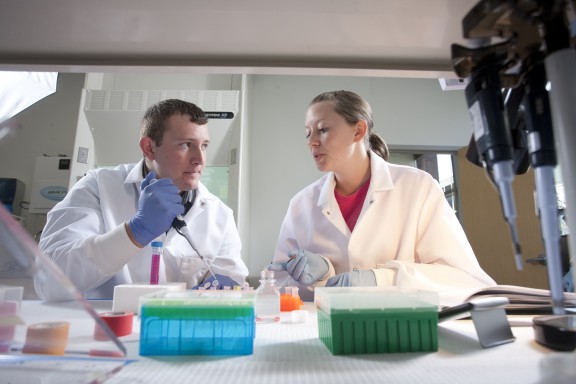
Students gain research experience through DUSCI
Kaila Swain will graduate from Drake with significant research experience.
For the last year and half, Swain has worked closely with Olga Lazareva, assistant professor of psychology at Drake, and Martin Acerbo, a faculty member from the University of Iowa, to develop a study on the effects flash-based video games can have on aggression levels.
Throughout the study, Swain has served as a partner and collaborator — an opportunity often unavailable to undergraduates at larger institutions.
“It has been one of the highlights of my Drake experience because I am solving real-world problems outside of a classroom setting,” says Swain. “I have been a part of the process since the time this research idea was constructed. Now we are running trials and making our idea a reality.”
Because of Drake’s strong commitment to undergraduate research, Swain’s experience isnot unusual for Drake students. Through the Drake University Science Collaborative Institute (DUSCI), the University supports Drake’s science majors who work one-on-one with faculty on research projects or want to develop research of their own.
According to Maria Valdovinos, director of DUSCI and associate professor of psychology, the goal of DUSCI is to “ignite passions in our students for science” and to encourage collaboration among all the scientific fields.rnrnWhile the opportunity to conduct research is meaningful, the ability to share that research and discover research in other fields is equally important. To help students learn to communicate their findings, DUSCI hosts the Drake University Conference on Undergraduate Research in the Sciences (DUCURS) in April, where students are able to present their research to peers and experts in the field.
In addition to DUCURS, Drake students can gain research and presentation experience during the summer. Through DUSCI’s Summer Undergraduate Research Fellowship Program, students can apply to spend eight weeks focusing on a particular research topic and report their findings to other participants at the end of the summer. Students also have the opportunity to share their research at conferences around the country.
“The students do so well while presenting that people say to me, ‘I didn’t realize Drake had a graduate program.’ I tell them, ‘These are undergraduates’,” Valdovinos says.
Starting this year, Drake students are able to communicate their research in writing through a new undergraduate journal in the natural sciences, which will publish through the efforts of DUSCI in May.
“It’s one thing to be in a lab and do. It’s another to learn the art of dissemination,” says Valdovinos. “There is meaning behind what we do, and students need to learn how they get that information out.”
The undergraduate journal is just one example of the ways DUSCI has expanded opportunities to students this year. For the first time, DUSCI’s summer research program will be open to education majors who seek endorsements in the sciences. While just one education major will conduct research this summer, Valdovinos hopes they can expand this learning opportunity in the future.
“Conducting research will enhance and make them better teachers,” Valdovinos says. “It teaches them about the scientific process, familiarizes them with the research process and expands their knowledge.”
DUSCI will also give education majors the opportunity to teach science this summer through the Wide World of Science summer camp. Twelve middle school students with backgrounds that are usually underrepresented in the science, technology, engineering and math fields will attend the camp. During the five-day camp, the education majors will lead lessons on topics such as exercise physiology, biology, chemistry and environmental science. Valdovinos hopes the camp will spark the interest of the middle school students and encourage them to pursue scientific fields later in life.
“By encouraging young scientists, we are disseminating the impact DUSCI has within Iowa,” Valdovinos says.
-Elizabeth Ford Kozor, AS’07, JO’07′


